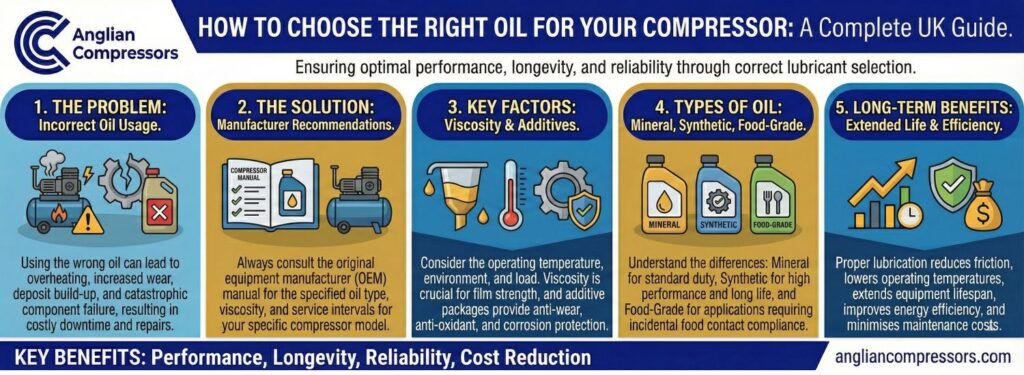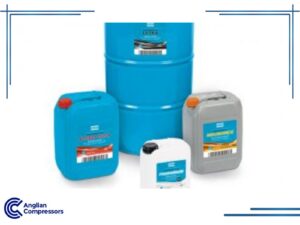How to choose the right oil for your compressor
Just as a well-oiled machine runs smoothly, compressed air relies on the right oil for optimal performance and longevity. While not all compressors require oil, those that do depend on it as a vital lubricant, reducing friction and wear between moving parts. This crucial function ensures the compressor operates efficiently, reliably, and safely.
Using the correct oil ensures smooth operation and protects against overheating and contamination.
However, choosing the wrong oil can have a direct impact on your bottom line. It can lead to increased operational costs, unexpected downtime, and a shorter lifespan for your valuable equipment. This guide will explore the critical role of oil in your air compressor, delve into the different types available, and provide you with the knowledge to select the best oil to maximise performance and keep your business running smoothly.
How is Air Compressor Oil Different from Other Types?
Would you put cooking oil in your car engine? The same principle applies to air compressors. While it might be tempting to use alternative lubricants, standard oil or hydraulic fluid will cause significant damage to your air compressor systems.
Here is why dedicated air compressor oil is essential.
- Unique Formulation: Air compressor oil is designed to withstand high heat, pressure, and moisture conditions inherent in compressor systems. Unlike standard oils, compressor oil prevents the formation of carbon deposits, extending machine life.
- System Compatibility: Improper oil can lead to clogged filters, damaged seals, reduced efficiency, and increased wear on components.
- Operational Risks: Using unsuitable oil compromises compressor lifespan, increases breakdown risks, and negatively impacts energy efficiency.

Synthetic vs. Mineral Oil: Which is Right for Your Air Compressor?
Choosing the right oil type is essential for your compressor’s longevity and performance. Two main types of air compressor oil are available: synthetic and mineral-based oils, each with distinct benefits.
Synthetic Oil: Best for High-Performance Compressors
Synthetic oil offers superior protection, especially in extreme conditions. It performs exceptionally well in high temperatures and continuous operation, reducing friction and wear.
- Enhanced Efficiency: Synthetic oils like those used in Atlas Copco’s rotary screw compressors provide better thermal stability and oxidation resistance, reducing downtime and maintenance frequency.
- Long-Term Savings: While the initial cost is higher, the longer oil change intervals and improved compressor efficiency translate into reduced operational costs.
Mineral Oil: Affordable for Less Demanding Applications
Mineral oil, refined from crude petroleum, is cost-effective for compressors operating in moderate conditions.
- Drawback: Requires frequent oil changes and is less efficient in high-temperature environments, increasing operational wear over time.
Which to Choose?
For compressors that operate under heavy load or in extreme environments, synthetic oil is the best option. For lighter or intermittent use, mineral oil is a more affordable alternative. Always follow your compressor manufacturer’s recommendations to ensure the proper air compressor oil for your specific application.

Factors to Consider When Choosing Oil
Several other factors play a crucial role in ensuring optimal performance and longevity for your equipment.
Compressor Type and Requirements
Different types of air compressor designs have varying lubrication needs.
- Rotary Screw Compressors: Require oils with high thermal stability and anti-foaming properties to handle continuous operation.
- Reciprocating Compressors: Benefit from oils with rust inhibitors and wear protection due to start-stop operation cycles.
- Centrifugal Compressors: Need oils with exceptional shear stability to maintain performance at high rotational speeds.
Viscosity Needs
Viscosity is critical for maintaining proper lubrication.
- Match Temperature Demands: Use higher-viscosity oils in high-temperature environments to prevent thinning, as recommended by Atlas Copco.
Additives enhance oil performance by reducing oxidation, preventing foaming, and minimising wear.
- Antioxidants: Increase oil lifespan by resisting sludge formation.
- Anti-wear Agents: Form protective films on metal parts to reduce friction.
Additives
Modern compressor oils often include additives to enhance their performance and protective qualities. These additives are designed to address specific challenges faced within a compressor system.
For example, anti-wear agents create a microscopic protective film on metal surfaces, reducing friction and minimising wear over time. Antioxidants, as their name suggests, prevent oil oxidation, a process that can lead to sludge build-up and shorten the oil’s usable life, particularly in high-temperature applications. Rust and corrosion inhibitors are also common, safeguarding metal components against moisture damage.
Another crucial function of additives is controlling foam. Even tiny air bubbles can create a layer of foam on the oil’s surface, exposing it to oxygen and accelerating oxidation. Extensive foaming can even alter the oil’s composition and reduce its lifespan, leading to pressure loss, increased energy consumption, and potential damage.
Understanding the role of these additives can help you make a more informed decision when selecting an oil, but always prioritise the recommendations of your compressor manufacturer.
Environmental Considerations
Biodegradable oils are a sustainable choice for operations in sensitive areas.
- Eco-Friendly Options: Atlas Copco offers oils with reduced environmental impact to support green initiatives.

Specific Lubricants for Air Compressor Brands: Why the Right Oil Matters
Using manufacturer-recommended oils is essential for optimal performance and longevity.
- Tailored Formulation: Brand-specific oils, such as those from Atlas Copco, are engineered to withstand specific operating pressures and temperatures.
- Warranty Protection: Most manufacturers require specific oils to maintain warranty coverage.
Why Manufacturer-Recommended Oil is Essential
Tailored Formulations
Brand-specific oils are engineered to withstand the pressures and temperatures of your compressor, ensuring smooth operation and minimising wear on critical components. Generic oils may lack the necessary additives to protect against friction, oxidation, and foaming, which can shorten your compressor’s lifespan.
Compatibility and Efficiency
Using the wrong oil can result in issues such as clogged oil filters, damaged seals, and increased downtime. Brand-specific oils ensure compressor efficiency by providing the correct viscosity and thermal stability, keeping your equipment running smoothly and efficiently.
Warranty and Long-Term Protection
Most manufacturers require specific oils to maintain warranty coverage. Although brand-specific oils may seem more expensive initially, they reduce the need for frequent oil changes and help prevent costly repairs, making them a smart investment for long-term compressor maintenance.
Using the right air compressor oil ensures that your machine operates smoothly, avoids damage, and remains within warranty guidelines—ultimately saving you money in the long run. Always follow your compressor manufacturer’s recommendations for the best results.
How Often Should Air Compressor Oil Be Changed?
The frequency of oil changes varies depending on the compressor type and usage conditions.
- Rotary Screw Compressors: Typically require oil changes every 7,000+ hours or 12 months, whichever comes first.
- Reciprocating Compressors: Recommend quarterly oil changes for optimal performance.
However, if you cannot find this information, then use what’s provided below as a general guide:
- Rotary screw air compressors – Most rotary screw-type compressors need oil replaced every 7,000+ usage hours. When this usage is spread over longer than 12 months, then whatever is the shorter period.
- Reciprocating air compressors – With reciprocating-type compressors, every quarter is typically the recommended interval.
Always check the manufacturer’s recommendations, as environmental factors such as dust and humidity can necessitate more frequent oil changes.
Risks Associated with Using the Wrong Oil
Using improper oil can lead to:
- Component Damage: Increased friction, clogged filters, and seal damage.
- Operational Inefficiencies: Higher energy consumption due to poor lubrication.
- Breakdowns: More frequent failures requiring costly repairs.
Bad oil can create deposits across movable parts, over the oil circuit, and elsewhere that interfere with functionality. Seals won’t function perfectly, added oxygen where it’s not needed is detrimental, and increases potential internal corrosion too. The overall lifespan of the air compressor suffers accordingly.
Critical components such as essential pumps, and even bearings lacking adequate and appropriate lubrication change pressure levels, increase unwanted friction and lead to wasted energy. Breakdowns are likelier, requiring a servicing stoppage and leading to lost productivity. Furthermore, failure rates – just like with other machinery lacking essential lubricants – increase significantly.
Always use high-quality, manufacturer-recommended oils for your compressor to avoid these issues.
Due to this, air compressor operators should pay particular attention to the oils used.
Contact Us
If you need help choosing which oil is right for your Air Compressor, please contact Anglian Compressors, a Branch of Atlas Copco Compressors.
FAQ
How do I select the right oil type for my air compressor?
Selecting the correct oil type for your air compressor depends on several factors, including the compressor model, operating conditions, and manufacturer recommendations. Always consult your compressor manufacturer’s guidelines, as using the correct oil ensures optimal performance and extends the compressor’s lifespan. For most compressors, synthetic or standard compressor oil is recommended, though some specific applications may require specialised lubricants, such as Atlas Copco oil.
Can I use motor oil or hydraulic oil in my air compressor?
No, using motor oil or hydraulic oil in air compressors is not recommended. Air compressor oil is specially formulated to withstand the high temperatures and pressures inside the compressor. Motor oil or hydraulic oil lacks the necessary additives and properties to protect the compressor, which can lead to damage, reduced efficiency, or premature wear. Always use the oil type specified by your compressor manufacturer for the best results.
How often should compressor oil be changed?
The frequency of oil changes depends on your air compressor model and its usage. Most compressors require oil changes after a specific number of operating hours, typically every 7,000+ hours for rotary screw compressors or quarterly for reciprocating models. Regular oil changes are essential for maintaining compressor performance and preventing wear. It’s also a good idea to perform regular oil analysis to monitor the oil’s condition and ensure optimal performance.

